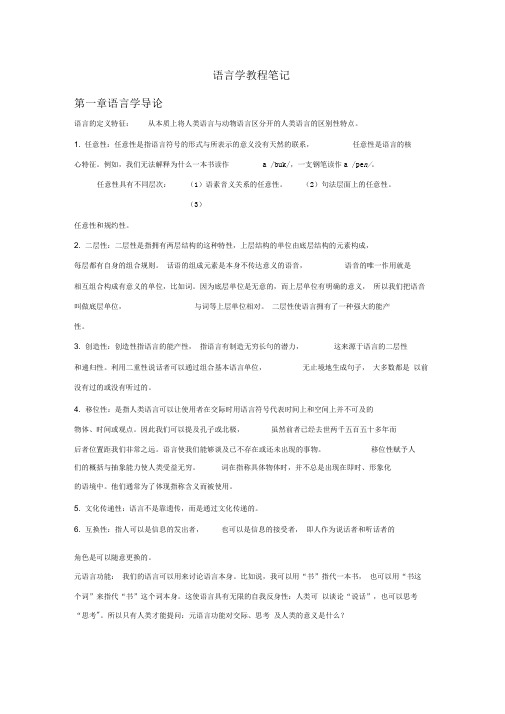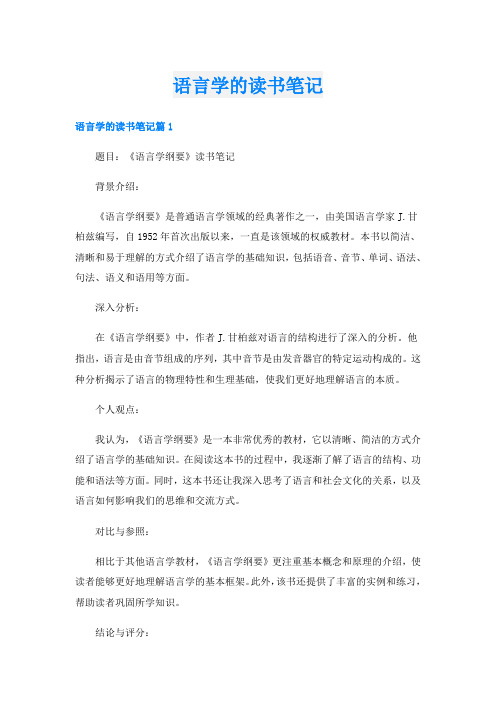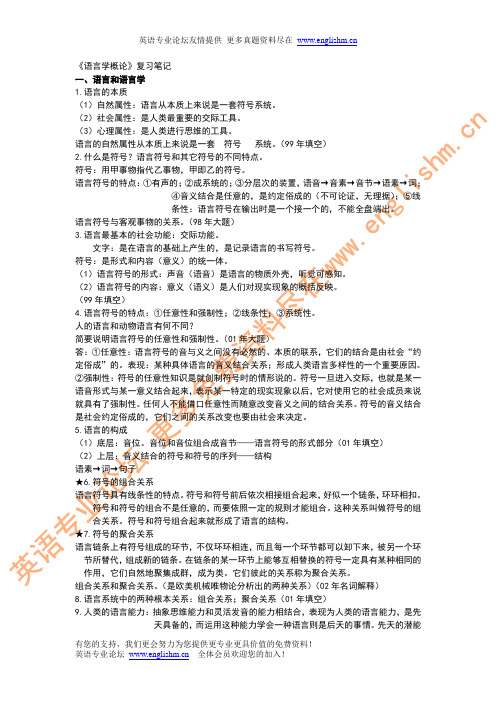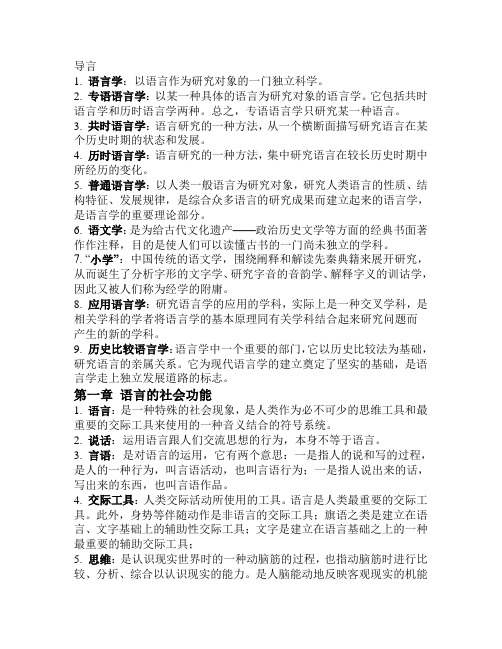语言学笔记
《语言学教程》中文笔记(完整)

语言学教程笔记第一章语言学导论语言的定义特征:从本质上将人类语言与动物语言区分开的人类语言的区别性特点。
1. 任意性:任意性是指语言符号的形式与所表示的意义没有天然的联系,任意性是语言的核心特征。
例如,我们无法解释为什么一本书读作 a /buk/,一支钢笔读作a /pe n/。
任意性具有不同层次:(1)语素音义关系的任意性。
(2)句法层面上的任意性。
(3)任意性和规约性。
2. 二层性:二层性是指拥有两层结构的这种特性,上层结构的单位由底层结构的元素构成,每层都有自身的组合规则。
话语的组成元素是本身不传达意义的语音,语音的唯一作用就是相互组合构成有意义的单位,比如词。
因为底层单位是无意的,而上层单位有明确的意义,所以我们把语音叫做底层单位,与词等上层单位相对。
二层性使语言拥有了一种强大的能产性。
3. 创造性:创造性指语言的能产性,指语言有制造无穷长句的潜力,这来源于语言的二层性和递归性。
利用二重性说话者可以通过组合基本语言单位,无止境地生成句子,大多数都是以前没有过的或没有听过的。
4. 移位性:是指人类语言可以让使用者在交际时用语言符号代表时间上和空间上并不可及的物体、时间或观点。
因此我们可以提及孔子或北极,虽然前者已经去世两千五百五十多年而后者位置距我们非常之远。
语言使我们能够谈及已不存在或还未出现的事物。
移位性赋予人们的概括与抽象能力使人类受益无穷。
词在指称具体物体时,并不总是出现在即时、形象化的语境中。
他们通常为了体现指称含义而被使用。
5. 文化传递性:语言不是靠遗传,而是通过文化传递的。
6. 互换性:指人可以是信息的发出者,也可以是信息的接受者,即人作为说话者和听话者的角色是可以随意更换的。
元语言功能:我们的语言可以用来讨论语言本身。
比如说,我可以用“书”指代一本书,也可以用“书这个词”来指代“书”这个词本身。
这使语言具有无限的自我反身性:人类可以谈论“说话”,也可以思考“思考"。
语言学的读书笔记

语言学的读书笔记语言学的读书笔记篇1题目:《语言学纲要》读书笔记背景介绍:《语言学纲要》是普通语言学领域的经典著作之一,由美国语言学家J.甘柏兹编写,自1952年首次出版以来,一直是该领域的权威教材。
本书以简洁、清晰和易于理解的方式介绍了语言学的基础知识,包括语音、音节、单词、语法、句法、语义和语用等方面。
深入分析:在《语言学纲要》中,作者J.甘柏兹对语言的结构进行了深入的分析。
他指出,语言是由音节组成的序列,其中音节是由发音器官的特定运动构成的。
这种分析揭示了语言的物理特性和生理基础,使我们更好地理解语言的本质。
个人观点:我认为,《语言学纲要》是一本非常优秀的教材,它以清晰、简洁的方式介绍了语言学的基础知识。
在阅读这本书的过程中,我逐渐了解了语言的结构、功能和语法等方面。
同时,这本书还让我深入思考了语言和社会文化的关系,以及语言如何影响我们的思维和交流方式。
对比与参照:相比于其他语言学教材,《语言学纲要》更注重基本概念和原理的介绍,使读者能够更好地理解语言学的基本框架。
此外,该书还提供了丰富的实例和练习,帮助读者巩固所学知识。
结论与评分:总的来说,《语言学纲要》是一本优秀的语言学教材,它简洁明了地介绍了语言学的基础知识,并深入分析了语言的结构和功能。
我建议语言学专业的学生和教师阅读这本书,并给予它五星的高分。
语言学的读书笔记篇2题目:《语言学概论》读书笔记在阅读《语言学概论》这本书的过程中,我深深地感受到了语言学的博大精深。
语言学是一门研究人类语言现象的学科,它涵盖了语言的结构、功能、历史演变等方面,同时也涉及到语言与社会、文化、心理等方面的关系。
通过阅读这本书,我对语言学的基本概念和方法有了更加清晰的认识。
本书的作者从语言的结构入手,介绍了语音、词汇、语法等基本要素。
作者认为,语言的结构是语言的基础,也是语言学研究的重要内容。
同时,作者还介绍了语言的交际功能,强调了语言在人类社会中的重要作用。
语言学笔记

语言学笔记总体把握:比例:绪论总论25%绪论:语言学的性质和任务、方法和分类、回顾和小结、作用和意义。
总论:从宏观的角度介绍语言的本质和发展,语言的本质主要从语言和言语的区别与联系、语言的社会功能、语言的内部的大致结构等三方面阐述的。
语言的发展主要掌握发展的原因、规律特点、发展过程及结果。
题型:解词、填空、选择、结合例子简答或论述。
语音25%-30%掌握了生理属性(发音器官的三大部位)、物理属性(语音四要素)后,要全力掌握语音物质外壳的各种结构单位,即音素、音位、音节和语流。
音位集中体现了语音的社会属性,是全章的重点,划分与归并音位的原则是每次必考的问题。
英语和汉语的元音与辅音音素。
把汉语的元音与辅音的描写方法尽量记熟。
题型:解词、选择、填空、综合运用。
语义25%语义的定义、语言意义和言语意义的区别。
语言意义的重点在词汇意义(词义)上,如词义的性质特点特别是对词义的义素分析及词义的聚合类——语义场。
义素分析重点对亲属词及近义词的分析。
言语意义主要是研究语义与语境的关系如语境对语义的影响、语义在语境中变化的模式。
语义变化的原因、途径、结果。
词汇15%—20%词汇的重点在语素(词素)和词及词组的定义和区别、语素的分类(词根、词缀和词尾)、词的构词法及词的结构类型(语音构词、语义构词和语法构词以及合根法、附加法和减缩法)。
词汇的分类和固定词组等。
语法20%要结合外语和汉语的例子进行。
对词的分类范畴要注意分类标准。
句法的内部意义有显性意义和隐形意义。
显性意义主要指陈述、修饰、支配、平行、补充等关系和主谓、偏正、动宾、联合、后补等结构。
分析层次性的方法——直接成分分析法,尤其是对歧义句的分析。
结合层次分析的树形图、句式转换的规则。
文字5%文字的性质、作用、起源、发展、类别及改革与创制交叉语言学不考一、绪论名词:语言学、语言学概论、历史语言学、对比语言学、历史比较语言学、描写语言学、历时语言学、共时语言学、个别语言学、组合关系、聚合关系、普通语言学、微观语言学、宏观语言学、理论语言学、语文学、语言、言语、思维、符号、渐变性、参差性、语言的分化、语言的整化、语言的融合知识点:1、印度、希腊与罗马、中国,被认为是语文学的三个源头。
《语言学概论》复习笔记

《语言学概论》复习笔记一、语言和语言学1.语言的本质(1)自然属性:语言从本质上来说是一套符号系统。
(2)社会属性:是人类最重要的交际工具。
(3)心理属性:是人类进行思维的工具。
语言的自然属性从本质上来说是一套符号系统。
(99年填空)2.什么是符号?语言符号和其它符号的不同特点。
符号:用甲事物指代乙事物,甲即乙的符号。
语言符号的特点:①有声的;②成系统的;③分层次的装置,语音→音素→音节→语素→词;④音义结合是任意的,是约定俗成的(不可论证,无理据);⑤线条性:语言符号在输出时是一个接一个的,不能全盘端出。
语言符号与客观事物的关系。
(98年大题)3.语言最基本的社会功能:交际功能。
文字:是在语言的基础上产生的,是记录语言的书写符号。
符号:是形式和内容(意义)的统一体。
(1)语言符号的形式:声音(语音)是语言的物质外壳,听觉可感知。
(2)语言符号的内容:意义(语义)是人们对现实现象的概括反映。
(99年填空)4.语言符号的特点:①任意性和强制性;②线条性;③系统性。
人的语言和动物语言有何不同?简要说明语言符号的任意性和强制性。
(01年大题)答:①任意性:语言符号的音与义之间没有必然的、本质的联系,它们的结合是由社会“约定俗成”的。
表现:某种具体语言的音义结合关系;形成人类语言多样性的一个重要原因。
②强制性:符号的任意性知识是就创制符号时的情形说的。
符号一旦进入交际,也就是某一语音形式与某一意义结合起来,表示某一特定的现实现象以后,它对使用它的社会成员来说就具有了强制性。
任何人不能借口任意性而随意改变音义之间的结合关系。
符号的音义结合是社会约定俗成的,它们之间的关系改变也要由社会来决定。
5.语言的构成(1)底层:音位。
音位和音位组合成音节——语言符号的形式部分(01年填空)(2)上层:音义结合的符号和符号的序列——结构语素→词→句子★6.符号的组合关系语言符号具有线条性的特点。
符号和符号前后依次相接组合起来,好似一个链条,环环相扣。
语言学纲要(考研笔记)

导言1. 语言学:以语言作为研究对象的一门独立科学。
2. 专语语言学:以某一种具体的语言为研究对象的语言学。
它包括共时语言学和历时语言学两种。
总之,专语语言学只研究某一种语言。
3. 共时语言学:语言研究的一种方法,从一个横断面描写研究语言在某个历史时期的状态和发展。
4. 历时语言学:语言研究的一种方法,集中研究语言在较长历史时期中所经历的变化。
5. 普通语言学:以人类一般语言为研究对象,研究人类语言的性质、结构特征、发展规律,是综合众多语言的研究成果而建立起来的语言学,是语言学的重要理论部分。
6. 语文学:是为给古代文化遗产——政治历史文学等方面的经典书面著作作注释,目的是使人们可以读懂古书的一门尚未独立的学科。
7. “小学”:中国传统的语文学,围绕阐释和解读先秦典籍来展开研究,从而诞生了分析字形的文字学、研究字音的音韵学、解释字义的训诂学,因此又被人们称为经学的附庸。
8. 应用语言学:研究语言学的应用的学科,实际上是一种交叉学科,是相关学科的学者将语言学的基本原理同有关学科结合起来研究问题而产生的新的学科。
9.历史比较语言学:语言学中一个重要的部门,它以历史比较法为基础,研究语言的亲属关系。
它为现代语言学的建立奠定了坚实的基础,是语言学走上独立发展道路的标志。
第一章语言的社会功能1. 语言:是一种特殊的社会现象,是人类作为必不可少的思维工具和最重要的交际工具来使用的一种音义结合的符号系统。
2.说话:运用语言跟人们交流思想的行为,本身不等于语言。
3. 言语:是对语言的运用,它有两个意思:一是指人的说和写的过程,是人的一种行为,叫言语活动,也叫言语行为;一是指人说出来的话,写出来的东西,也叫言语作品。
4. 交际工具:人类交际活动所使用的工具。
语言是人类最重要的交际工具。
此外,身势等伴随动作是非语言的交际工具;旗语之类是建立在语言、文字基础上的辅助性交际工具;文字是建立在语言基础之上的一种最重要的辅助交际工具;5. 思维:是认识现实世界时的一种动脑筋的过程,也指动脑筋时进行比较、分析、综合以认识现实的能力。
语言学笔记大全

同样的意义内容,在不同的语言中有不同的语音形式,这是不同的社会习惯决定的,是不同的民族在创造这个词的时候选择了不同的语音形式,各个社会的成员约定俗成的,因为语音形式和意义的联系是任意的,非本质的,所以不同语言之间出现这样的差异就不奇怪了。
四、怎样理解语言符号的任意性和线条性特点?
任意性和线条性是语言符号的两个最基本的特点。语言符号的任意性是指语言符号的音义关系是由社会约定的,用什么样的“音”去表达什么样的“义”人们说不出什么道理,完全由社会约定,这种音义关系又叫约定性;语言符号的线条性是指符号的使用只能在时间的线条上绵延,一个符号跟着一个符号依次出现。如以“小王打碎了杯子”为例,每个字只能顺着时间的先后一个跟着一个说出来,绝不能在同一时点同时蹦出两个字来。依次出现的符号要遵守一定的规则,不能随意编排。这就是说,符号的线条性是由规则支配的,对社会成员具有强制性。如“我吃饭”不能说成“饭吃我”。但是,语言又是不断发展变化的,具有可变性特点。如一些新词的出现,一字词的新用法。这种变化,又从另一个方面说明了语言符号的任意性特点,也即语言符号的音义联系是社会约定的,而不是天然的、本质的联系。
4、用“棋、下、有、一、完、没、的、盘”这八个词组成句子,看能组合成多少句子?
这些词可以组合成下列句子:
一盘没有下完的棋、没有下完的一盘棋、没有一盘下完的棋、没下完的棋有一盘、下完的棋一盘没有、下完的棋没有一盘、有一盘没下完的棋、有没下完的一盘棋、棋没下完的有一盘、棋有一盘没下完……
5、语言实际上是一种社会现象,怎样理解这句话?
二、什么是语言符号?为什么说语言是一种符号系统?
语言学纲要(重点笔记)
语言学概论•绪论•一、语言学的概念•1、语言:是一种特殊的社会现象,是人类最重要的交际工具,是人类的思维工具。
•2、语言学:以语言为研究对象的科学,研究探索语言的本质、结构和发展规律。
•二、关于语言学课程•本课程是中文专业必修的基础理论课之一,主要内容:语言在社会中的地位和作用;语言的结成体系(语音、语汇和语义、语法、文字、修辞);语言的发展变化;语言的应用。
•学生通过本课程的学习,能比较系统地掌握语言学的基本概念、基本理论和基础知识,为提高语言理论水平、进一步学习和深入研究其他语言课程奠定必要的语言理论基础。
•三、语言学的三大发源地•中国、印度、希腊-罗马•1、中国古代的语言学•语文学:主要是为古代经典书面著作作注释,目的是使人们可以读懂古书的一门尚未独立的学科。
也是偏重从文献角度研究语言文字的学科总称,一般包括文字学、训诂学、音韵学、校勘学等。
中国由于古代文献丰富,文字比较特殊,语文学比较发达,广义的语文学也应该包括语言学,也就是语言学和文字学的总称,但现在由于国际学术分科中语言学是一大类,所以目前反而是语文学从属于语言学,成为语言学的一个分支。
•小学•2、印度的语言学成就•特点:不是重于理论,而是基于观察。
所讨论的理论基本上与文学研究与哲学争论有关。
词的性质和句子意义被经常讨论,句子与其所包含的词之间的语义关系,也是经常讨论的问题之一。
•贡献:A、区分了外显即时表达和内含永久主体。
认为语言有两种,一是具体场合说的话,一是抽象的语言原则。
B、语音学和音位学方面有突出成就。
认为语音是连接语言和话语之间的桥梁,语音描写分三部分:发音过程、语音的组成成分(元音,辅音)、语音在音位结构中的结合。
C、语法描写和分析方面有突出成就。
潘尼尼在著作中详细的描述了各种屈折变化、派生现象、组织结构和各种句法的用法。
•印度学者在词法研究方面取得了很大的成就:他们在分析词的构成时发现了¡°词根¡±、¡°后缀¡±与¡°词尾¡±三种主要造词单位。
新编语言学教程刘润清重点笔记
新编语言学教程刘润清重点笔记一、语言学的基本概念1. 语言学的定义语言学是研究人类语言的科学,旨在探讨语言的结构、功能、演变和使用规律。
2. 语言的特征语言具有多样性、可变性、创造性和交际性等特征,是人类文化和社会生活的重要组成部分。
3. 语言的层次结构语言包括语音、词汇、句法、语义和语用等层次结构,每个层次相互交织,共同构成了具体的语言系统。
二、语音学1. 语音和语音学的基本概念语音是语言的声音表现形式,语音学是研究语音的学科,主要包括语音的产生、分类和规律等内容。
2. 语音的分类语音可以根据发音部位、发音方法和语音特征进行分类,这些分类对于理解不同语言的语音现象具有重要意义。
3. 语音的运用语音系统是语言的基础,正确、标准的语音能够促进交际的顺利进行,也是语音教学的重要内容。
三、语音变化规律1. 语音演变的观点语音演变是语言发展的必然规律,主要有自然演变和人为干预两种形式。
2. 语音演变的原因语音演变的原因有内在原因和外在原因两类,其中心理因素和社会因素是主要的影响因素。
3. 语音演变的类型语音演变的类型包括同化、咀嚼、发音简化、重音移位和音位交替等,这些类型在不同语言中都有所体现。
四、词汇学1. 词汇的概念词汇是语言中最基本的语言单位,包括单词和词组两种形式,构成了语言的基本载体。
2. 词与词的关系词的构词规律和词的语义关系是词汇学的重要研究内容,也是词汇教学中需要重点关注的问题。
3. 词的分类词可根据词性、构词法、语义感情色调和语言长短等属性进行分类,不同的分类体系能够为语言的学习和教学提供指导。
五、句法学1. 句法结构的基本要素句法结构主要包括主语、谓语、宾语等要素,这些要素之间的组合形式决定了句子的结构类型。
2. 句法关系的层次结构句法关系包括层级结构和包含关系,这些关系是句子语法结构的重要组成部分。
3. 句法结构的功能句法结构的功能包括构句、分句和复句等,这些功能是语法结构的基本表现形式。
语言学教程第五版重点笔记
语言学教程第五版重点笔记语言学是研究语言的科学,它涉及到语言的结构、发展、使用和功能等方面。
本篇笔记将重点总结语言学教程第五版的内容,包括语言学的基本概念、语音学、形态学、句法学、语义学和语用学等。
1.语言学的基本概念-语言:人类沟通的主要方式,具有符号性、规则性和交际性。
-语言的属性:可描述为音、形、意的体系,通过语音、文字等媒介来传递信息。
-语言与方言:方言是指在某个地区或群体中使用的语言变体,而语言是方言的高级别组织。
-语言的历史演变:语言随着时间推移会发生变化,并分化成不同的语言家族和亚族。
2.语音学-语音:语言中最小的语言单位,由音素构成。
-音位和音素:音位是在特定语言中具有区别词义的最小音段,而音素是语音学上对音位的理论概念。
-发音:语音的实际发声过程,包括发音器官的运动和声带的振动。
-音系:特定语言中的音位组合,反映了该语言中的音素系统。
3.形态学-形态:语言中用来构成词的基本单位。
-词的形态结构:词根、词缀和词尾等构成词的部分。
-词的形态类型:自由词和词素词。
-词类:词根或词素所属的语法类别,如名词、动词、形容词等。
4.句法学-句子:语言中最小的完整意义单位。
-短语:句子的组成部分,由词汇构成。
-句法关系:短语之间的语法关系,如主谓关系、动宾关系等。
-句法结构:句子的组织方式,包括短语结构和依存结构。
5.语义学-语义:语言中词、短语和句子所表达的意义。
-词义学:研究词汇的意义,包括词义分类、词义变化等。
-句义学:研究句子的意义,包括句子的真值条件、逻辑关系等。
6.语用学-语用:语言使用的实际情境。
-言外之意:在语言表面之下所包含的意义。
-会话分析:研究对话和交际行为的学科。
以上是《语言学教程》第五版的重点内容。
通过学习这些知识,我们可以更深入地了解语言的结构和使用规律,从而更好地理解和运用语言。
语言学概论笔记(第一章)
语言学概论笔记第一章:语言和语言学一、识记内容。
1、口语:语言的客观存在形式首先是有声的口头语言。
2、书面语:文字出现以后,语言的第二种客观存在形式。
3、符号:指的是根据社会的约定俗成使用某种特定的物质实体来表示某种特定的意义而形成的这种实体和意义的结合体。
4、能指:语言符号的物质实体能够指称某种意义的成分。
5、所指:也就是“能指成分”,即特定的物质实体,所指的意义内容。
6、聚合关系:在同一个位置上可以互相替换出现的各个语言单位处在互相可以联想起来的关系之中,因而聚合成为一个类。
7、组合关系:组合关系体现为一个语言单位和前一个语言单位或后一个语言单位,或和前后两个语言单位之间的关系,也体现了部分与整体之间的关系。
8、语言学:是研究语言的科学。
9、普通语言学:语言学界把研究人类社会的语言这种社会现象的一般理论。
10、理论语言学:把研究某种具体语言的语言学称为汉语语言学或英语语言学等等,把侧重理论探讨的称为理论语言学。
11、应用语言学:把侧重语言学理论和成果的实际应用。
12、传统语言学:一般泛指20世纪以前的语言学,特别是指索绪尔开创的结构主义语言学以前的语言学。
13、结构主义语言学:索绪尔创立的语言学可以称为“结构主义语言学”,至于我国内常说的“结构主义语言学”、“结构主义语法”,往往只是指在国外影响较大并且我国语言学界比较熟悉的美国结构主义描写语言学,那只是当代结构主义语言学的一个流派,并不等于受索绪尔影响的整个结构主义语言学。
二、领会内容(不用识记,大体知道即可)1、言语交际是一个编码和解码的过程。
答:人要说话所需要的因素:生活经历、社会环境、当前处理的问题、社会问题、文化问题、哲学问题、逻辑问题。
人要接受语言所需要的因素:组织与分析的能力、心理、生理问题;发音、听音的器官和神经网络及机制和能力;复杂的生理和物理问题。
总之一句话,言语交际是通过许多因素对语言进行编码和解码的过程,言者编码,听者解码。
- 1、下载文档前请自行甄别文档内容的完整性,平台不提供额外的编辑、内容补充、找答案等附加服务。
- 2、"仅部分预览"的文档,不可在线预览部分如存在完整性等问题,可反馈申请退款(可完整预览的文档不适用该条件!)。
- 3、如文档侵犯您的权益,请联系客服反馈,我们会尽快为您处理(人工客服工作时间:9:00-18:30)。
《简明英语语言学》笔记Chapter 1 IntroductionWhat is linguistics?●Definition: the scientific study of language.● A discipline that data and theory stand in a dialectical complementation;that is, a theory without the support of data can hardly claim validity, and data without being explained by some theory remain a muddled mass of things.●The scope of linguistics:✧General linguistics: study language as a whole✧Specific aspects:1)Phonetics: the study of sounds2)Phonology: how sounds are put together and used to convey meaning3)Morphology: how symbols are formed and combined to form word4)Syntax: study the rules of how to form grammatically correct sentence5)Semantics: the study of meaning6)Pragmatics: the study of meaning in the context of language use✧Interdisciplinary branches:1)Sociolinguistics2)Psycholinguistics3)Applied linguistics●Important distinctions✧Prescriptive and descriptive:1)Descriptive: Describe and analyze the language that people actuallyuse2)Prescriptive: Lay down rules for correct and standard behavior inusing language3)Modern language is mostly descriptive. Modern language, which isscientific and objective, describes language people actually use, be itcorrect or not.✧Synchronic and diachronic1)Synchronic: describe language at some point of time in history, al-ways in its current existence.2)Diachronic: the description of language as it changes through time; itstudies the historical development of language over a period of time.3)In modern linguistics, synchronic approach enjoys priority.✧Speech and writingSpeech is prior to writing in linguistics, for it is more natural and revealsmore true feature of language.✧Langue and parole1)Langue: abstract system shared by all members of language com-munity; it is the set of conventions and rules that language users haveabide by2)Parole: Concrete use of language.3)Saussure: 1) parole is simply a mass of linguistic language facts; 2)linguist should abstract langue from parole, i.e. to discover the regu-larities governing the actual use of language✧Competence and Performance-American linguist Chomsky1)Competence: knowledge of rules of language2)Performance: the realization of this knowledge in linguistic commu-nication3)The imperfect performance is caused by social and psychologicalfactors.✧Traditional grammar and modern linguistics1)Linguistics is descriptive while traditional grammar is prescriptive.2)Modern linguistics regard spoken language as primary.3)Modern linguistics does not force languages into Latin-basedframework.What is language?●Definition of language✧Language is a system of arbitrary vocal symbols used for human com-munication.1)Language is a system, which means elements of language are com-bined according to rules.2)Language is arbitrary in the sense that there is no intrinsic connectionbetween a linguistic symbol and what the symbol stands for.3)Language is vocal because the primary medium for all language issound.4)Language is human-specific.●Design feature1)Arbitrariness: logical connection between meaning and sounds.While some words are motivated: the first are onomatopoeic words,such as rumble, crash, bang; the second are compound words, e.g.photocopy. This kind of words only make up small percentage ofvocabulary. The arbitrary nature of language is a sign of sophistica-tion of language and make it possible for language to have an unlim-ited source of expressions.2)Productivity: language is productive or creative in that it makespossible the construction and interpretation of new signals by its us-ers.3)Duality: basic level: a structure of soundsHigher level: sounds of language can be rearranged intomorphemes and words4)Displacement: 不受时空限制的5)Cultural transmission: human have to be learned and taught beacquire language.●Functions of language✧Descriptive function: convey factual informationExpressive function: supplies informationSocial function: maintain social relations between people✧Structural linguist Roman JakobsonAddresser---emotive: addresser express his attitude towards thetopic or situationAddressee---conative: the addresser aims to influence addressee’sactionContext---referential: addresser conveys a message or informationMessage---poetic: use language to display the beauty of languageContact---phatic communication: it tries to establish or maintain in-terpersonal relationsCode---metalinguistic: make clear the meaning of language itself✧In early 1970 British linguist M.A.K. Halliday7 function in children.3 in adults:Ideational function: organize one’s experience, attitude, evaluation,feeling, and emotionsInterpersonal function: establish and maintain interpersonal rela-tionsTextual function: organize written or spoken English in such amanner that they are coherent within themselves and fit the particularsituation in which they are usedChapter 2 PhonologyThe phonic medium of language✧Limited range of sounds constitute the phonic medium of language.✧The individual sounds within the range are the speech sounds.Phonetics●What is phonetics?✧Phonetics is defined as the study of the phonic medium of language; it isconcerned with all the sounds that occurs in the world’s languages.✧Articu latory phonetics: studies the sounds form speaker’s point ofView, i.e. how the speaker uses his speech organs to articulate thesoundsAuditory phonetics: studies from the hearer’s point of view, i.e. howthe sounds are perceived by the hearerAcoustic phonetics: the way sounds travel by looking at the soundswaves.Chapter 4 SyntaxWhat is it?●Syntax is a branch of linguistics that studies the rules the govern the formation of sen-tences.Words categories●In traditional grammar, there are 8 categories (called parts of speech). Non-traditionalcategories as determiner (Det), degree words (Deg), and qualifier (Qua).●Two division✧Major lexical categories: the heads around which phases are built. Noun, verb, ad-jective, preposition.✧Minor lexical categories: determiner限定词, degree words, qualifier限定语, aux-iliary, conjunction.●Criteria:✧Meaning: 1) nouns often designate its entity; verbs often designate action, sensation,and states. 2) the property or attribute of a noun can be elaborated by adjectives,those of verbs, adverbs.Deficiencies: 1) some words do not have entity such as dilemma, friendship.2) some words belong to more than one categories3) words with same or similar meaning belongs to different catego-ries, e.g. be aware of a nd know✧Inflection: 1) noun → -s or –es indicating plural2)adjectives→-er or –est indicating comparative degree and superla-tive degree3)verb→-ing and –ed indicating progressive and past tenseDeficiency: some words do not take inflections✧Distribution: it is reliable, which indicates what type of elements can co-occur withcertain words.Noun co-appear with determiner, e.g. a girl, the penVerbs with auxiliary, e.g. should openAdjectives with degree words, e.g. very coolPhrase categories and their structure●XP ruleXP→Specifier ——head—— complementNP→(Det) N (PP) …VP→(Qual) V (NP) …AP→(Deg) A (PP) …PP→(Deg) P (NP) …●Coordination rule✧No limit on the number of coordinated categories prior to the conjunction.✧ A category at any level (head or XP) can be coordinated.✧Coordinated categories must be of the same type.✧The category type of coordinate phrase is identical to the category type of elementsbeing conjoined.✧Structure: X→X, X, X…Con XPhrase elements:●Specifiers✧Role:1) semantically, make more precise the meaning of head; 2) syntactically,mark the phrase boundary.●✧Provide information and location, attached to right of the head✧Monotransitive: open the doorDitransitive: send me the mailComlex transitive verbs: put it on the wall✧Complement clauseMiss Herbert believes that she will win.Matrix clause complementizer complement clause✧CP complement●Modifiers✧To modifier nouns →adj. phrases✧To modifier verbs →adv. Phrases and prepositional phrasesPosition of modifiersModifiers Positions ExamplesAP PP AdvP Precedes the headFollow the headPrecedes or followA very careful girlOpen with careRead carefully; carefully readSentences (the S rule)Inflp= (s)NP Inlf VP。
